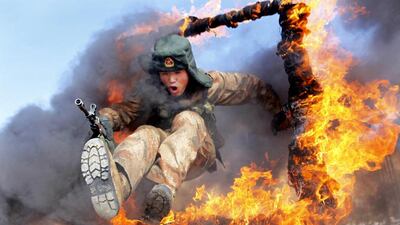BEIJING // China on Wednesday extended its spending spree on the world’s largest armed forces, unveiling a 12.2 per cent increase in the defence budget for 2014 and provoking concern in Japan.
Beijing has for years been raising spending on the People’s Liberation Army (PLA) in double-digit steps, reflecting its military ambitions as it asserts its new-found economic might and its claims in a series of territorial disputes with Tokyo and others.
The spending has raised eyebrows in the region and Washington.
“We will resolutely safeguard China’s sovereignty, security and development interests,” the prime minister, Li Keqiang, said at the opening of the Communist Party-controlled National People’s Congress (NPC).
Beijing will “place war preparations on a regular footing” and “build China into a maritime power”, he said.
“We will safeguard the victory of World War II and the post-war international order, and will not allow anyone to reverse the course of history,” Mr Li said, a phrase China often uses in relation to Japan.
China has been expanding its naval capabilities in recent years, with its first aircraft carrier going into service in September 2012.
Beijing and Tokyo’s vessels and aircraft regularly shadow each other near disputed East China Sea islands called Diaoyu in Chinese and Senkaku in Japanese, raising fears of a clash.
A budget report prepared for the NPC meeting said that “the appropriation for national defence is 808.23 billion yuan (Dh484.42bn), up 12.2 per cent”.
Shortly after the announcement Japan expressed concern about Beijing’s openness about the PLA, which includes the army, navy and air force.
“The transparency of China’s defence policy and military capacity, or lack thereof, has become a matter of concern for the international community, including Japan,” the chief cabinet secretary, Yoshihide Suga, said.
This year’s stated increase follows rises of 10.7 per cent in 2013, 11.2 per cent in 2012 and 12.7 per cent in 2011.
Analysts believe China’s actual military spending is significantly higher than publicised, with the Pentagon estimating it at between US$135bn (Dh495.45bn) and $215 billion in 2012.
The United States remains far ahead as the global leader in defence spending, with Washington approving a 2014 budget of $633bn in December.
But the Pentagon intends to scale back the US army by more than an eighth to between 440,000 and 450,000 active-duty troops, its lowest level since the Second World War.
Even though Beijing’s spending could match that of Washington by the 2030s, the International Institute for Strategic Studies said in February, its capabilities, expertise and ability to project power would require several more years to catch up.
Currently, China devotes about three times as much as India to defence, and more than neighbours Japan, South Korea, Taiwan and Vietnam combined.
The increases have raised concern in the US and Asia, particularly in Japan.
In comments ahead of the NPC, the gathering’s spokeswoman Fu Ying sought to play down such worries.
“Certain countries have been selling the idea of China as a major threat,” she said. “Based on our history and experience, we believe that peace can only be maintained by strength.”
China’s actions will both fuel the worries of its neighbours and encourage them to strengthen security cooperation with each other and the US, said Denny Roy, an expert on China’s military at the East-West Centre in Hawaii.
“This would add to the momentum of something that’s already in motion,” he said.
In December the cabinet of Japan’s hawkish prime minister, Shinzo Abe, agreed to spend 24.7 trillion yen (Dh885.88bn) between 2014 and 2019 in a strategic military shift towards areas of the country facing China, a 5 per cent boost to the defence budget over five years.
Beijing decried Tokyo’s increase at the time as an issue of “great concern to neighbouring countries in Asia and the international community”.
China’s drive to modernise its military stems from an overall ambition to enhance its global stature rather than disputes with neighbours, Mr Roy said.
Strengthening its maritime forces was important for projecting power further afield, he said.
Following delivery of the Liaoning carrier, he said, China was eager to build up carrier battle groups, and eventually to be able to secure its oil supplies from the Middle East if necessary.
“China would be doing much of its modernising and building as it is now anyway,” Mr Roy said. “I think fundamentally it’s (about) China’s commitment to attaining great power status.”
That meant having “a strong military commensurate with China’s status in other areas – its size, its wealth, political influence, cultural influence”.
* Agence France-Presse

